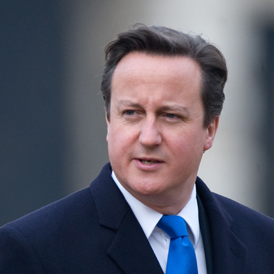PM’s private land deal with lobbyist raises questions
The prime minister is facing questions over the details of a purchase of land in his constituency home following an investigation by Channel 4 News.
Channel 4 News discovered that this summer David Cameron and his wife paid £137,500 for a strip of land linked to this country property and an additional field from a political friend and neighbour.
Intriguing details have emerged about this transaction that raise questions over how much the public should know about the financial dealings of the prime minister.
In 2001, Mr Cameron paid £650,000 for his constituency home – a purchase aided by around £150,000 in parliamentary expenses. When Mr Cameron bought this home, he also acquired a patch of land up the lane. This was separated from the main house by a driveway and garages belonging to a cottage opposite.
There can be no doubt about it that Mr Cameron’s political antennae I’m sure would tell him that there are sensitive issues here. Sir Alistair Graham
From inspection of Land Registry documents, Channel 4 News found that in November last year, Conservative peer and Tory donor Lord Chadlington, who owns a large manor house nearby, bought the cottage for £715,000, thereby taking ownership of the driveway and garages which ran across the prime minister’s land.
More desirable property
Eight months later, in July this year, Lord Chadlington sold the prime minister the driveway and garages together with a large field which he owned at the back of Mr Cameron’s constituency home for £137,500.
The result was the Camerons now own a much more desirable property with its own driveway and garages all set on a larger coherent plot of land.
According to one expert we consulted, the price the Camerons paid Lord Chadlington for this extra land is a fair price. So is this simply a property deal between friends that should remain private?
There is no suggestion whatsoever of any conflict of interest or financial gain. Number 10
Lord Chadlington is the chief executive of one of Britain’s largest public relations groups, called Huntsworth. This group also owns a number of lobbying firms such as Quiller Consultants that act for major financial, retail and telecoms companies.
Lord Chadlington personally acts for several specific clients including the Stock Exchange, Associated British Foods and the Carlyle Group.
No conflict of interest
Channel 4 News wanted to know what the rules would be governing such a transaction. Sir Alistair Graham, former chairman of the Committee of Standards in Public Life, reviewed the details; he believes the six-figure property deal raises questions over the parliamentary rules governing conflicts of interest.
“It’s perfectly understandable why the PM and his family may have wanted to purchase this particular strip of land … but given that it does involve a transaction with, in a sense, a political colleague, somebody who is very close to the PM, who heads up major lobbying firms, who has blue chip companies as clients, then there can be no doubt about it that his political antennae I’m sure would tell him that there are sensitive issues here.”
Sir Alistair points out that the prime minister is bound by the ministerial code which requires that “no conflict arises, or could reasonably be perceived to arise between the ministerial position and their private interests, financial or otherwise”. A Downing Street source has said that the transaction “was all checked by officials”.

Lobbyist
Sir Alistair also believes the prime minister should have declared the deal in the House of Commons register of members interests as it involves a financial transaction with a political lobbyist – there is no reference to the deal in the register at present.
“I would’ve thought he would’ve wanted to have done that as quickly as possible, particularly given his public comments about lobbying…If you’re doing a private deal affecting your personal interests with one of the head of the largest lobbying firms in this country then of course you should register that in your MP’s list of interests as quickly as possible.”
A Downing Street spokesman said on Wednesday: “There is no requirement to disclose or register this transaction. The Prime Minister has handled this issue properly and in accordance with the Ministerial Code.
“He sought assurances from the Government’s Head of Propriety and Ethics and the Principal Private Secretary at Number 10 who advised that, because this was a public transaction and the full market rate had been paid for the land, there was no need to declare it in the list of Ministers’ Interests. It was also their conclusion that there was no actual, or appearance, of a conflict of interest.”
Lord Chadlington said in a statement: “To avoid any perception of a conflict, we instructed an independent surveyor to value the garages and land. We did not negotiate on price – the Prime Minister paid the market rate as recommended by the surveyor.”